"Weekly sales ranking": honey for Ideal, poison for competitors
![]() 08/06 2024
08/06 2024
![]() 703
703
Why do several automakers' executives get so upset about a weekly sales ranking?
It is customary for the automotive industry to release sales figures monthly, but since early 2023, the "weekly sales ranking" has gradually entered the public eye. Ideal Auto, whose sales lead the new energy vehicle industry, is the primary initiator of the weekly sales ranking, while other automakers have also participated by releasing their own weekly sales rankings with specific constraints, aiming to rank higher by segmenting the market.
However, recently, many automakers' executives have expressed their dislike of sales rankings, with executives from NIO, Geely, XPeng, and other automakers voicing their opposition to the weekly sales ranking on Weibo or at press conferences.
Ideal Auto, with its sales ranking first among new-energy vehicle startups, can showcase its strength by releasing weekly sales figures, potentially attracting more customers. However, for automakers with poor sales, each release by Ideal Auto feels like exposing their shortcomings. Beyond these apparent reasons, there are likely other factors driving the controversy surrounding weekly sales rankings.
Four automakers engage in a verbal spat, with Ideal poking fun at competitors
First, let's recap the sequence of events. On July 30, Ideal Auto released its weekly sales report for the 30th week of 2024 (July 22-28), ranking first among new-energy vehicle startups with 12,800 vehicles sold, maintaining its top position for 14 consecutive weeks.
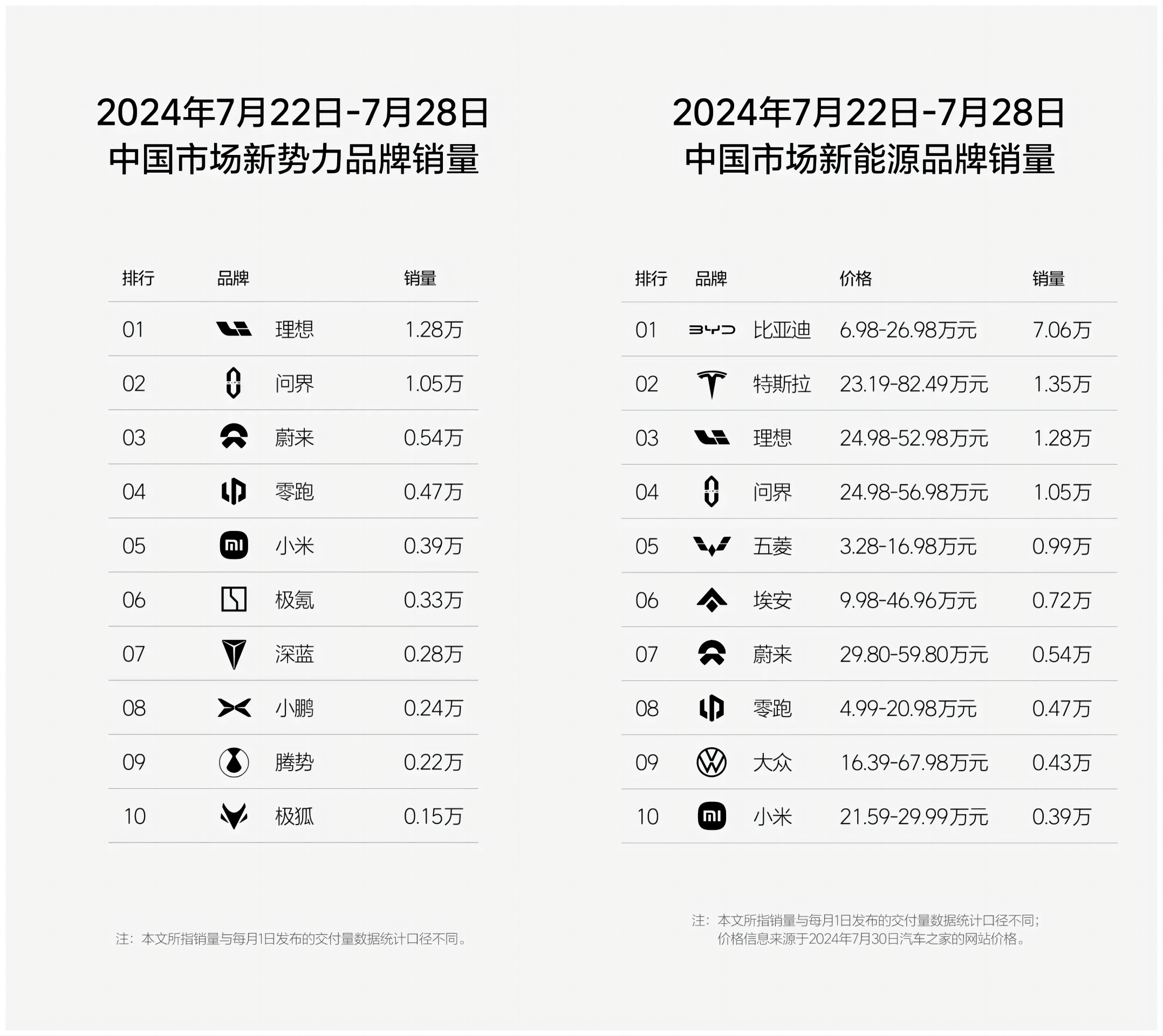
Subsequently, Ma Lin, Assistant Vice President of Brand and Communication at Shanghai NIO Automobile Co., Ltd., posted on Weibo, hoping that Li Xiang would stop releasing weekly sales rankings, arguing that such rankings contribute to low-level competition. Later, Ma Lin added that automakers release audited delivery figures monthly, which reflect their operating conditions and help users understand market trends and make decisions, but weekly sales rankings may disrupt normal business operations.
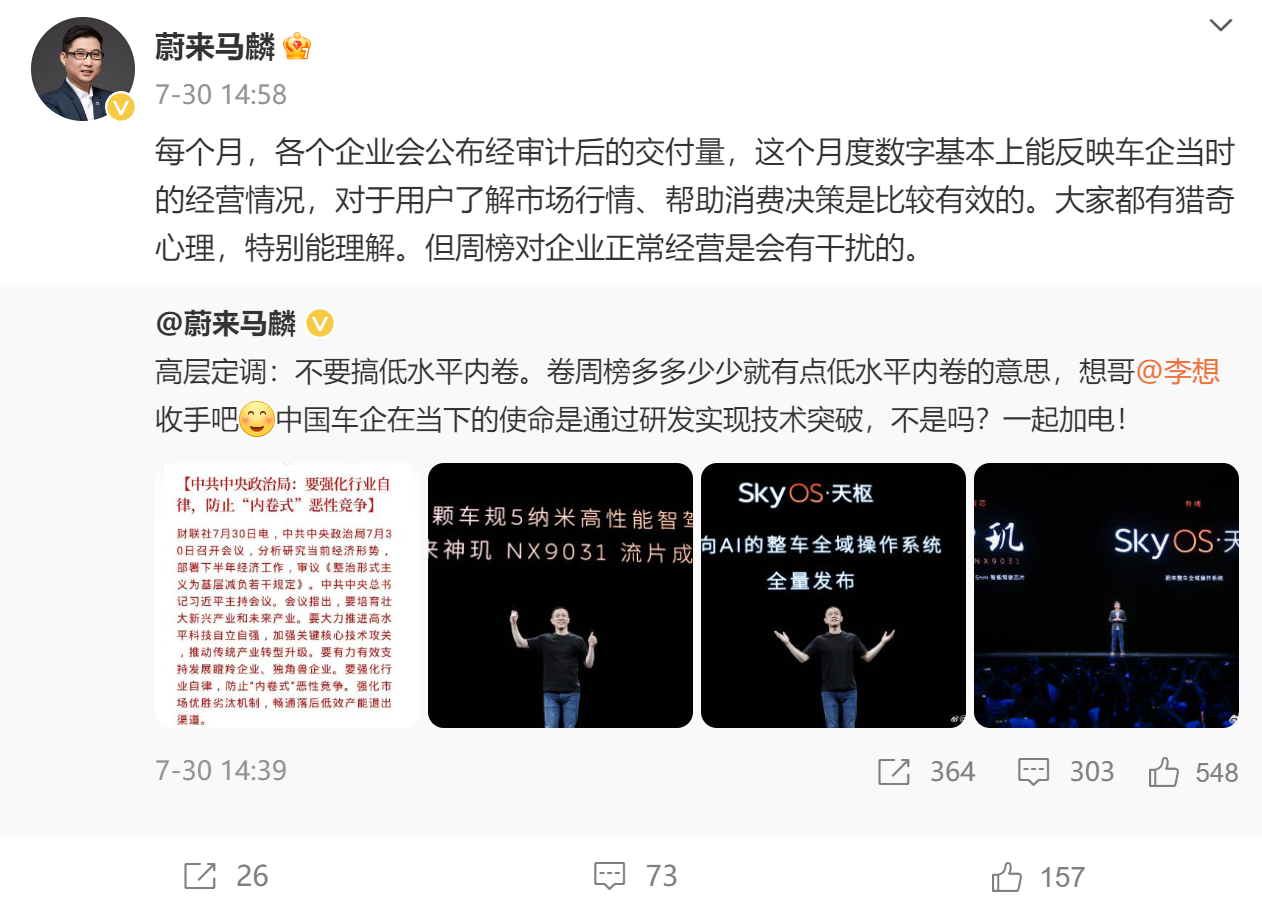
Shortly after Ma Lin's post, Yang Xueliang, Senior Vice President of Zhejiang Geely Holding Group, quickly joined the fray, retweeting Ma Lin's post and expressing his opposition to weekly sales rankings. Unlike NIO, which focuses on new-energy vehicles, Geely Group has significant sales in both traditional fuel vehicles and new-energy vehicles. In the first half of this year, Geely Holding Group (including Volvo, Lynk & Co., and other brands) sold 586,500 new-energy vehicles.
Geely Holding Group, which is expected to sell over one million new-energy vehicles this year, also opposes weekly sales rankings, supporting Ma Lin's argument. However, Yang Xueliang did not make any harsh statements, merely expressing his agreement calmly.
Hours after Ma Lin and Yang Xueliang's posts, He Xiaopeng, CEO of XPeng Motors, directly addressed the media and online audience at the XPeng AI Driving Technology Conference, stating, "Chinese tech companies are still engaged in weekly sales rankings and finding ways to make money. This is not how technology competition should look." The following day, Yang Xueliang retweeted a report on He Xiaopeng's remarks and agreed with his views.
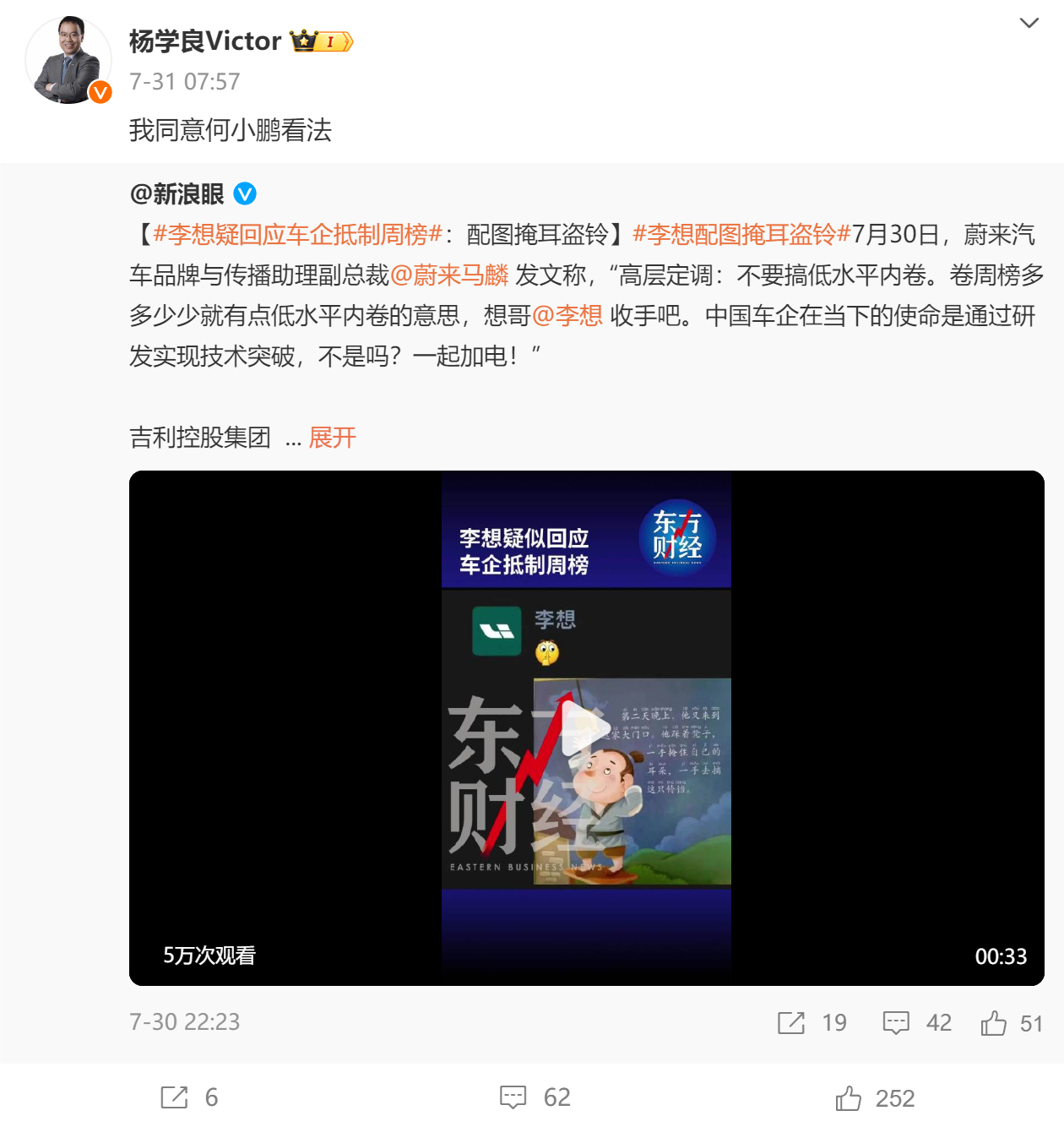
In fact, during a media Q&A session after NIO Day on July 27, NIO CEO William Li and Co-founder Qin Lihong expressed their dissatisfaction with weekly sales rankings. However, Ideal Auto's release of weekly sales figures on July 30 prompted Ma Lin and He Xiaopeng to voice their frustrations.
In response to opposition from competitors, Li Xiang hit back by posting an emoji of "plugging one's ears while stealing a bell" on WeChat Moments, seemingly mocking them for thinking that ignoring weekly sales rankings could hide their lagging sales figures.

Currently, Ideal Auto dominates the "weekly sales ranking debate," but with opposition from established automakers like Geely and new-energy vehicle startups like NIO and XPeng, should Ideal Auto continue with its weekly sales rankings?
Rejecting low-value competition: Should we start by ending weekly sales rankings?
The significance of weekly sales rankings lies in their marketing and promotional value, demonstrating that top-selling automakers are well-recognized by consumers.
Automakers like NIO and XPeng oppose the release of weekly sales rankings, arguing that they are often inaccurate, unreasonable, and contribute to low-value competition.
Regarding data authenticity, in July 2023, Huang Honglin, an executive at XPeng Motors, criticized the weekly sales report for the period from July 3 to July 9, stating that the information related to XPeng was false. Qin Lihong also noted that unaudited data is unreliable, and even within NIO, fewer than ten people would know the weekly sales figures. William Li emphasized that only four or five people are aware of them.
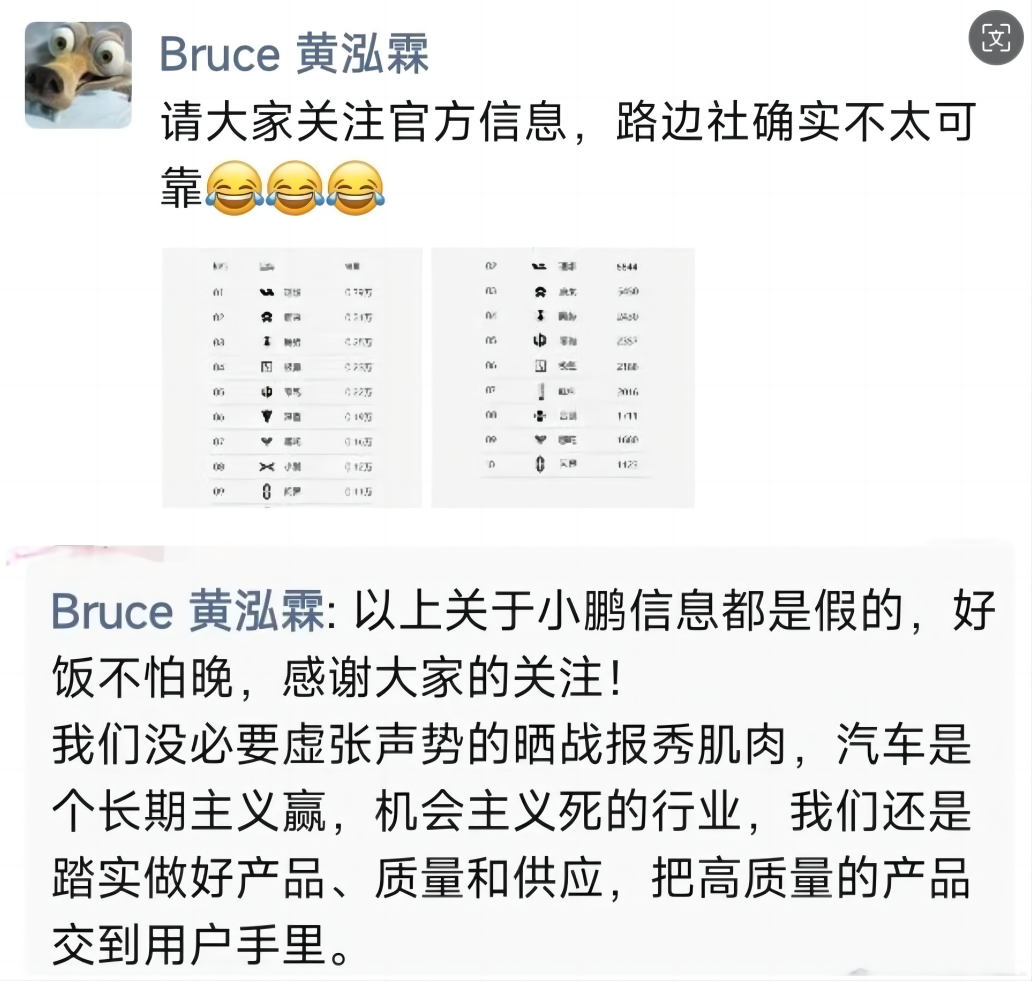
In response to doubts, Li Xiang previously stated that the data sources for the weekly sales rankings were from the China Association of Automobile Manufacturers' end-user retail sales figures, also known as insurance premiums paid, rather than actual sales or deliveries. Last May, Li Xiang complained that the insurance premium rankings had been subject to complaints and reports from competitors, forcing Ideal Auto to temporarily suspend releasing weekly sales data. A week later, Ideal Auto resumed releasing sales data rankings without specifying the data source.
As William Li and Qin Lihong noted, unaudited data may differ significantly from actual figures, and monthly sales reports should be considered more reliable.
Regarding the rationality of rankings, Ma Lin believes that Ideal Auto and Huawei's AITO are the top sellers in the extended-range electric vehicle segment, while NIO and Tesla lead in battery electric vehicles. Placing vehicles of different price points and categories on the same ranking cannot accurately reflect market conditions.

Indeed, if we segment the sales of pure electric and hybrid vehicles among new-energy vehicle startups, NIO would also rank first. From the ranking, there is a clear gap between the sales of hybrid and pure electric vehicles among high-end new-energy vehicle startups, which cannot truly reflect the product capabilities and market acceptance of automakers. Segmenting by pure electric and hybrid vehicles may be more reliable.
As for low-value competition, He Xiaopeng stated that while American automotive companies focus on end-to-end technology, Chinese companies are preoccupied with weekly sales rankings and arguing online. Ji Xuehong, Director of the Automotive Industry Innovation Research Center at North China University of Technology, believes that weekly sales rankings can put pressure on automakers from investors and consumers, and that automakers should focus more on improving product quality and added value.
As the new energy vehicle industry moves towards full intelligence, automakers like NIO, Ideal Auto, XPeng, and AITO have successively launched high-level autonomous driving systems and more user-friendly smart cockpits nationwide. Technology, user experience, and product quality represent high-level competition, while weekly sales rankings represent low-level competition. However, does focusing on weekly sales rankings hinder automakers from competing on technology and user experience? Should weekly sales rankings be eliminated solely because they represent low-value competition?
The double-edged sword of weekly sales rankings
This incident sparked numerous discussions among netizens across various platforms. Many believe that competing on technology and weekly sales rankings are not mutually exclusive and that focusing on weekly sales rankings does not hinder automakers from pursuing technological advancements. Some argue that automakers strive for technological advancements precisely to boost sales, aligning with the objectives of weekly sales rankings.
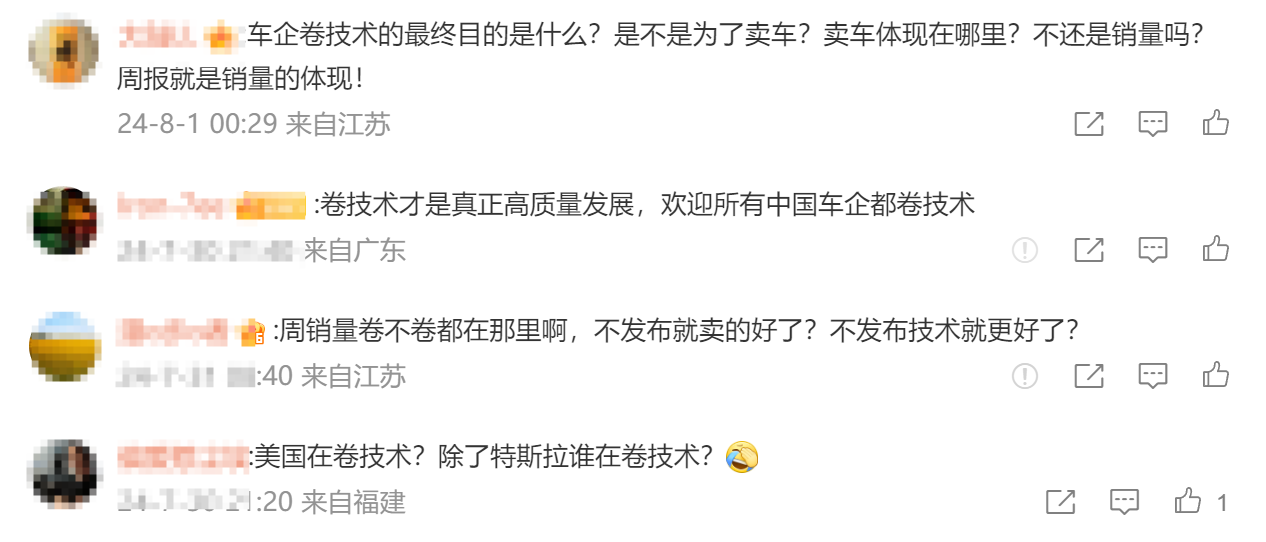
Whether Ideal Auto should continue releasing weekly sales rankings should be evaluated based on their positive and negative impacts rather than solely on their low-value nature.
The positive impact of weekly sales rankings is straightforward: they help top-selling automakers market themselves, creating a "stronger get stronger" scenario. Thus, their benefits primarily extend to leading new-energy vehicle startups.
The negative impact lies in the significant pressure they place on automakers with lagging new energy vehicle sales, potentially forcing them to prioritize short-term sales over long-term plans, hindering the industry's long-term development. While these negative effects may seem substantial, they are surmountable for automakers that ignore weekly sales rankings.

In reality, weekly sales rankings are a form of indirect marketing with limited effectiveness. Consumers are unlikely to disregard their needs and budgets solely based on sales figures when purchasing an Ideal Auto vehicle. Some automakers' intense reactions stem from the gradual stratification of new-energy vehicle startups' sales, with some automakers showing signs of falling behind, leading to their urgency.
Weekly sales rankings are less significant than their level of discussion, and their existence or absence is not crucial. Automakers will continue to compete on technology and value, with user experience remaining the core competitiveness of automobiles. In the process of industrial development and progress, some enterprises are bound to lag behind, and the elimination of some automakers is an inevitable part of industry development. Exploring consumer needs, developing more advanced technologies, and launching products that meet consumer demands should be the top priority for automakers. The heat surrounding weekly sales rankings will eventually subside.
Source: Leitech







